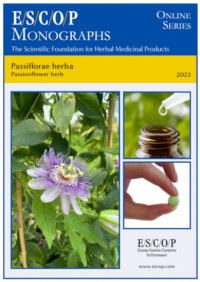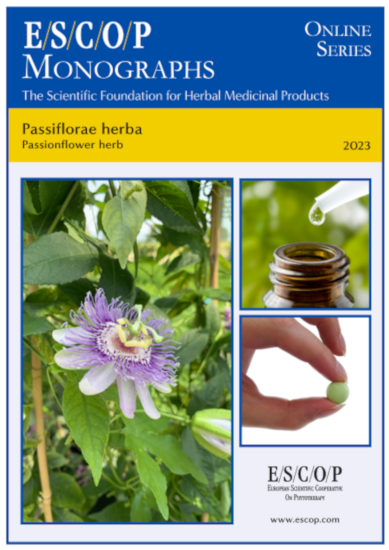
ESCOP monographs The Scientific Foundation for Herbal Medicinal Products. Online series. Passiflorae herba (Passionflower herb). Exeter: ESCOP; 2023.
Passiflorae herba (Passionflower herb)
Passiflora incarnata L.
Published: 30/8/2023
Format: PDF, 22 pages
>> Visualizar las monografías de ESCOP
Summary
The herbal monograph selects and summarizes scientific studies and textbooks regarding efficacy, dosage and safety to support the therapeutic uses of passionflower herb.
This herbal drug, by definition, consists of Passiflora incarnata L.
Studies with its main characteristic constituents glycosylflavonoids of apigenin and luteolin such as isovitexin, isoorientin and their 2"-beta-D-glucosides, schaftoside, isoschaftoside, vicenin-2 and swertisin as well as amino acids with GABA as dominant component are included.
The therapeutic indications are tension, restlessness and irritability with difficulty in falling asleep.
Administration of passionflower herb addresses posology; its duration of use and undesirable effects, such as allergic reactions.
In vitro experiments with passionflower herb or its extracts demonstrated effects on receptor binding, antioxidant and antibacterial activities as well as influences on the circadian rhythm of a mouse fibroblast cell line. In vivo experiments with passionflower herb or its extracts demonstrated sedative and anxiolytic effects in mice, rats and weaned piglets, effects on withdrawal symptoms in rats as well as antitussive, anticonvulsive, neuroprotective, anti-inflammatory, anti-nociceptive and anti-metabolic effects in mice, rats and guinea pigs.
Pharmacological studies in humans concern sedation and sleep quality.
Controlled clinical studies with passionflower herb demonstrated its use to alleviate symptoms of neuropsychiatric origin in patients.
Pharmacokinetics: In in vitro studies the metabolism of several flavonoids was studied.
Preclinical safety data were assessed in single and repeated dose toxicity studies as well as in an investigation on mutagenicity.
Clinical safety data were recorded in several studies.
The selection of literature cited in the monograph is aimed at bringing together relevant information about the possible physiological roles of passionflower herb and its major constituents.
Keywords
- Passiflorae herba
- Passionflower herb
- Passiflora incarnata L.
- CNS disorders
- Tension; restlessness; irritability with difficulty in falling asleep
Reference: European Scientific Cooperative on Phytotherapy. ESCOP monographs The Scientific Foundation for Herbal Medicinal Products. Online series. Passiflorae herba (Passionflower herb). Exeter: ESCOP; 2023.

